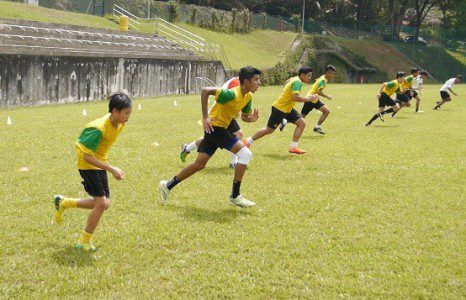 Yep, it’s August and it means in football world pre-season … that time of the year where you dig out your muddy old footy boots, lace them up and head to training. The worst part about it is it normally involves A LOT of fitness, beep tests, hill sprints, time trials etc etc. And I can’t even imagine what the first session of full contact is like!
Yep, it’s August and it means in football world pre-season … that time of the year where you dig out your muddy old footy boots, lace them up and head to training. The worst part about it is it normally involves A LOT of fitness, beep tests, hill sprints, time trials etc etc. And I can’t even imagine what the first session of full contact is like!
Sporting season is long … and most people who play at a recreational or semi professional level understandably spend their offseason doing anything but thinking about training for their particular sport, in our case football. This makes these initial sessions a little bit of a rude awakening as to just how unfit you have become in such a short space of time.
Training in the 6-8 weeks prior to a season is crucial not only to the success of the player, but to that of the team as in football, team work is the core for success.
Why is pre-season training for football so important?
To develop ‘Match Fitness’: Regardless of how naturally fit of an athlete you are and even if you have been regularly running and hitting the gym in the offseason, none of this prepares you specifically for the demands of football. The stop start nature of most sports combined with running, contact and unforeseeable events within the game make ‘match fitness’ a difficult thing to maintain unless your training is tailored towards that. You need to prepare the body for what’s coming.
Endurance training: By now, all of your endurance training should be in the form of interval training. Your football training should also become more specific during the late pre-season. Try to match the movement patterns you would find in a typical match. For example … Keep the intervals short and intense, include twists and turns and running backwards, train on grass and juggle a ball during active recovery periods etc.
Speed Training: As the competitive season draws closer your football training should place more and more emphasis on quickness and sharpness. Again your conditioning must be soccer specific. Vary your sprint starts for example, by running backwards for a few yards first, jumping to head a ball or controlling and passing a ball before sprinting etc.
Flexibility: As the volume and intensity of your football training increases flexibility training becomes even more essential.
Skill And Tactical Training: It is good to combine skill work with some of fitness training to save time. If you plan to do an intense interval training session do your skill work first. If there is a plan to combine plyometrics or sprint drills with skill work always perform the plyometrics or sprints first. It goes without saying…
The warm up should precede all of these.
Injury prevention: Obviously when playing a contact sport you can’t prepare yourself for ‘freak’ unavoidable accidents. That’s the nature of football and the game you play, BUT by implementing effective training programs especially including gym parts certain soft tissue injuries can be prevented or minimized.
Team bonding: There really is nothing more frustrating than getting to the first game of the season and some muppet turns up who hasn’t come to preseason at all, he doesn’t know the plays or the patterns and he just throws the entire balance of the team out! Its so obvious when teams have trained and played together because they just gel so well. Pre-season is vital to developing these relationships!
So boys and girls get your butts to preseason.. It may mean you spend less time in the physio room this year!
About The Author:
Jiri Cerny, General Manager & Head Coach at Givova Football Academy, BA in Sports management and football coaching, professional manager & UEFA “B” coach with 15 years experience including youth academies of Real Madrid and Juventus Turin.

